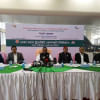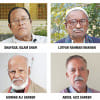[WATCH] Fighting tanks, guns with bows and arrows
Armed only with bows and arrows, brave young indigenous fighters are resisting modern artillery; such tales of courage are usually seen in novels or movies. However, the history of Bangladesh's bloody birth is full of such tales. We will tell you the story of the bravery and courage of Moulvibazar indigenous tea garden workers.
The wave of protests across the country during the six-point movement managed to touch the serene lives of indigenous tea garden workers as well. The proclamation of independence on March 26, 1971 and the news of mass killing spread like wildfire in the tea gardens. After March 7, workers staged agitations with bows and arrows.
On 27 March, 1971, indigenous people stood on a bridge at Kamalganj in Moulvibazar and fought the Pak army with homemade weapons. They shot arrows incessantly and many were left injured. After this incident Pakistan army faced strong resistance in every tea garden.
Around the middle of the 1971 war, Gurna Bhor, an indigenous freedom fighter, was killed at Doloi Tea Garden in Moulvibazar. Gurna Bhor was riddled with bullets when he tried to notify other freedom fighters of the Pakistani army's location.
The indigenous tea garden workers of Moulvibazar fought for independence, fought for their land, yet 44 years after independence they still remain landless. They did not receive any state recognition and their story of valor remains unknown.
The list of martyrs runs long in the district.
Indigenous Santal, Munda, Orao and Tanti communities in Rangpur also fought for independence in 1971.
In this month of victory, it is time to show our gratitude once more to these freedom fighters.

 For all latest news, follow The Daily Star's Google News channel.
For all latest news, follow The Daily Star's Google News channel. 








Comments